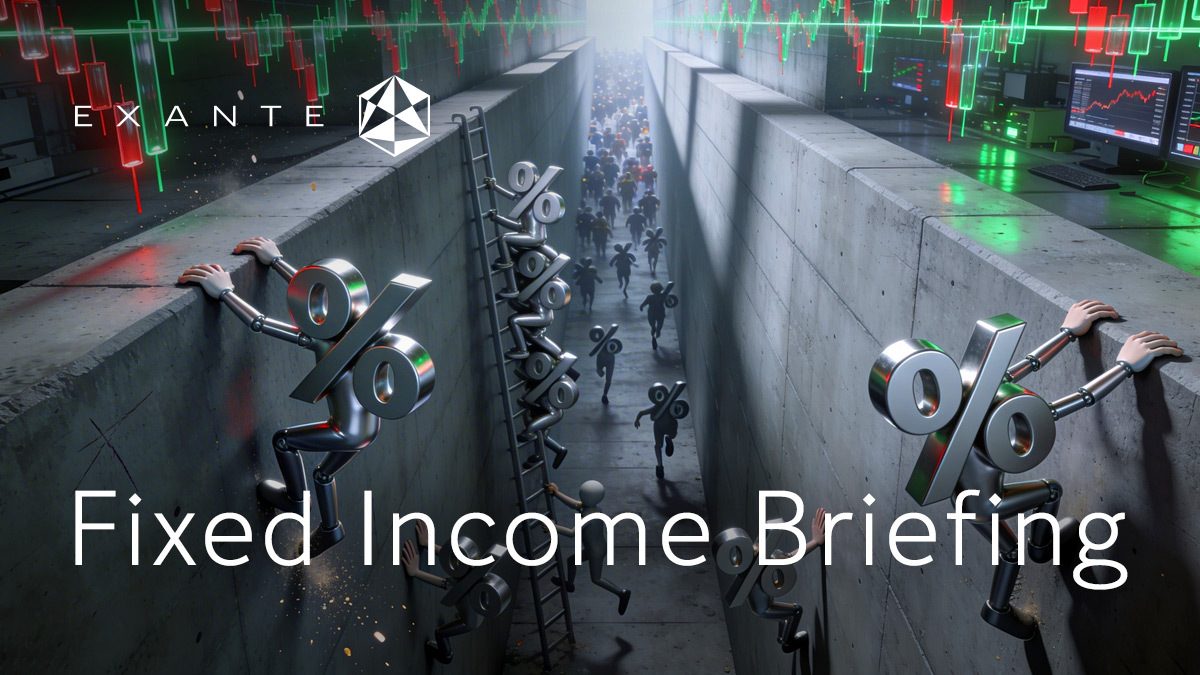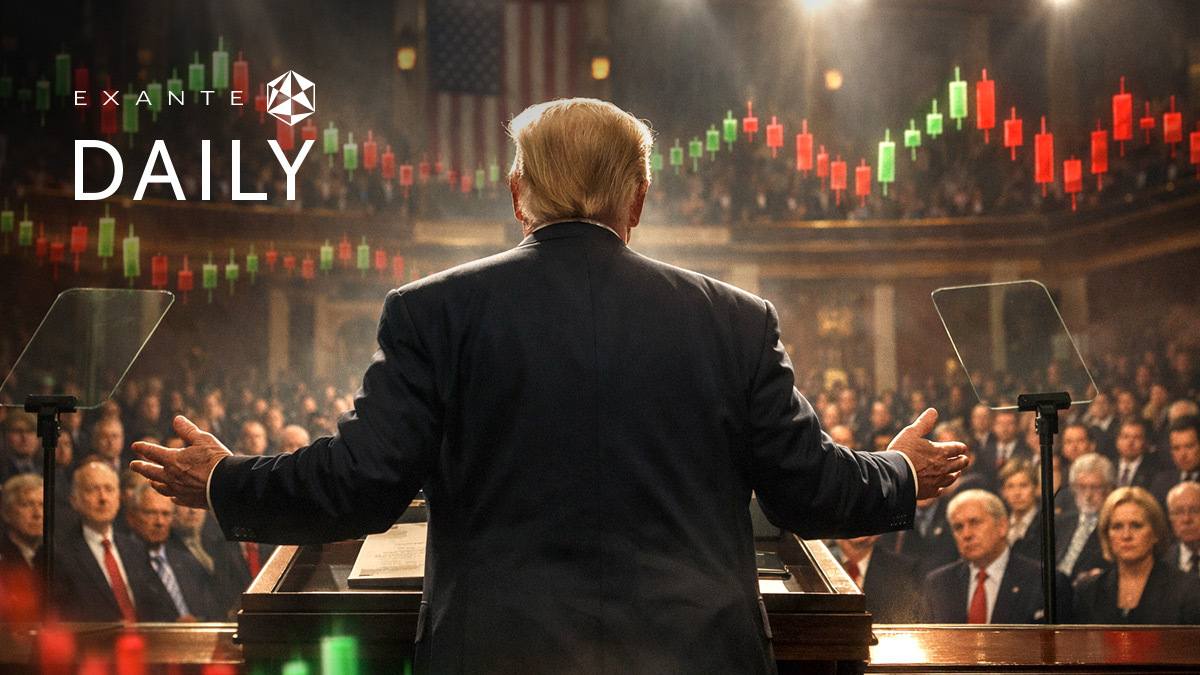
Are markets being too impatient?

Will concerns around energy security, climate change, and rising geopolitical risks accelerate the push to renewables and create a new commodity supercycle? Who will benefit and why? Find out more in the latest EXANTE RESEARCH report, Renewables and the New Commodity Superpowers.
Global market indices
Currencies
Cryptocurrencies
Fixed Income
Commodity sector news
Key data to move markets this week
Global macro updates
US Stock Indices
Nasdaq 100 -0.99% MTD and +44.33% YTD
Dow Jones Industrial Average +0.48% MTD and +8.98% YTD
NYSE +0.02% MTD and +5.98% YTD
S&P 500 +0.04% MTD and +19.02% YTD
Mega caps: A tough week for the “magnificent seven” mega caps as Apple has struggled to stay up while it seeks to reverse a decline in Mac and iPad sales and Alphabet, Amazon, Meta Platforms, Microsoft, Tesla, and Nvidia are all down.
Energy stocks had a bad week as the energy sector fell on the drop in crude prices as oversupply, uncertainty over OPEC+ cut commitments, and concerns around Chinese demand hit the sector. Occidental Petroleum, Baker Hughes, Halliburton, ExxonMobil, Phillips 66, Marathon Petroleum, Shell, Chevron, Apa Corp (US), ConocoPhillips, and Energy Fuels are all down this week.
ExxonMobil announced this week plans to raise share buybacks. It also said this week that it will target annual project spending of between $22 billion and $27 billion through 2027.The largest US oil producer put forth plans to boost spending on its nascent lithium and low carbon businesses by 18% throughout 2027.
Materials and Mining stocks had a poor week with the sector down. Copper prices fell for a third consecutive day on Wednesday as a stronger dollar outweighed concerns about the availability of copper concentrate. Aluminium was down, while lead was lower after touching its lowest price since June. Yara International, Mosaic, Nucor Corporation, Newmont Mining, CF Industries Holdings, Albemarle Corporation, and Freeport-McMoRan are all down. Only Sibanye Stillwater is up this week. It announced the financial close and start of construction of two additional renewable energy projects for its South Africa operations.The first renewable project, the Witberg wind energy project, located near Matjiesfontein in the Western Cape province with a contracted capacity of 103 MW, will generate renewable energy and supply the SA operations via a wheeling agreement with Eskom. The second project is a 150MWac solar photovoltaic project developed and financed by SOLA Group. Sibanye-Stillwater will procure 75MW of the plant’s capacity over a 10-year PPA.
European Stock Indices
Stoxx 600 +1.83% MTD and +10.63% YTD
DAX +2.72% MTD and +19.63% YTD
CAC 40 +1.71% MTD and +14.86% YTD
IBEX 35 +1.99% MTD and +24.66% YTD
FTSE MIB +1.98% MTD and +27.92% YTD
FTSE 100 +0.83% MTD and +0.85% YTD
Other Global Stock Indices
MSCI World Index -0.17% MTD and +14.55% YTD
Hang Seng -3.40% MTD and -16.77% YTD
Currencies
The US dollar rallied this week, hitting a two week high, as some traders began to consider that policy rate expectations may have gone too far. The GBP is -0.49% MTD and +3.83% YTD against the USD. Sterling was the best performing major currency in November following bullish remarks by BOE officials about maintaining tight policy. The Bank of England (BoE) is expected to trim rates by a much smaller margin next year than the Fed or ECB. Futures markets indicate that the first cut from the BoE might not happen until June, compared with March for the ECB and the Fed.The EUR is -1.09% MTD and +0.56% YTD against the USD. Its fall over the past few weeks is due to rising expectations that the ECB will start cutting rates in March 2024. Headline inflation in the eurozone has fallen significantly, down to 2.6% in November.
Cryptocurrencies
Bitcoin +16.10% MTD and +164.34% YTD
Ethereum +9.83% MTD and +87.50% YTD
Bitcoin continued to rise this week, fueled by optimism that the SEC will soon approve Bitcoin spot ETFs and that interest rates will start to come down in early Spring 2024. Thirteen firms including Grayscale Investments, BlackRock, Invesco, and ARK Investments, have pending applications with the SEC for ETFs that track the price of bitcoin.
Fixed Income
US 10-year yield to 4.12%.
German 10-year yield to 2.20%.
UK 10-year yield to 3.94%.

US benchmark 10-year yields fell over the past week, hitting a three month low on Wednesday, as investors continued to anticipate Fed cuts in early Spring 2024 as the economy continues to slow and jobs growth weakens. However, with the Fed's official fed funds rate now around the mid-point of the 5.25-5.50% range, rates futures market pricing has it being lowered to around 4.00% by the end of next year. This is would be in line with the Fed’s “higher for longer”.
Commodities
Gold to $2,026.75 per ounce.
Silver to $23.92 per ounce.
West Texas Intermediate crude to $69.38 a barrel.
Brent crude to $74.30 a barrel.
Gold has spent most of the past week benefitting from a weaker US dollar and falling Treasury yields. Investors will be looking closely to Friday’s nonfarm payrolls to get a better sense as to the potential trajectory of Fed policy and if rate cuts may materialise as early as expected.
Oil prices fell to their lowest level since June this week after WTI experienced its biggest one-day drop in more than two weeks due to a larger-than-expected rise in US gasoline inventories and worries about demand from a slowing Chinese economy despite.OPEC+ producers promising to cut production further into 2024.
OPEC oil output fell in November in the first monthly drop since July, a Reuters survey found, as a result of lower shipments by Nigeria and Iraq as well as ongoing market-supporting cuts by Saudi Arabia and other members of the wider OPEC+ alliance. OPEC's output is still undershooting the targeted amount by almost 700,000 bpd. A revision of output targets for 2024 should bring actual output closer to the target level.
Note: As of 5 pm EST 6 December 2023
Key data to move markets this week
EUROPE
Thursday: German Industrial Production, Eurozone Employment Change and Eurozone GDP.
Friday: Ecofin meeting, German Harmonised Index of Consumer Prices.
Tuesday: Eurozone ZEW Economic Sentiment, German ZEW Current Situation and Economic Sentiment.
Wednesday: Eurozone Industrial Production.
UK
Friday: Consumer Inflation Expectations.
Tuesday: Average Earnings, Claimant Count, Employment Change, and ILO Unemployment Rate.
Wednesday: GDP, Industrial Production, and Manufacturing Production.
US
Thursday: Challenger Job Cuts and Initial Jobless Claims.
Friday: Average Hourly Earnings, Labour Force Participation Rate, Nonfarm Payrolls, Unemployment, and Michigan Consumer Sentiment Index.
Tuesday: CPI and Monthly Budget Statement.
Wednesday: PPI, Fed Interest Rate Decision and Monetary Policy Statement, Interest Rate Forecast, and FOMC Press Conference.
CHINA
Thursday: Exports, Imports and Trade Balance.
Saturday: CPI and PPI.
Global Macro Updates
US job markets rule the markets. Following on from Tuesday’s JOLTS report which showed that job openings were at a 2 1/2 year low in October, falling 617,000 to 8.733 million in October, Wednesday’s ADP National Employment Report showed that private payrolls rose by only 103,000 jobs last month. However, worker productivity grew, putting more downward pressure on labour costs. Traders are also focused on Friday’s US nonfarm payrolls for signs that softening in the employment market is becoming entrenched. A cooling labour market with slowing wage growth and falling inflation would increase the likelihood of Fed rate cuts taking place in the early Spring. The Fed is expected to leave rates unchanged at its meeting next Wednesday.
ECB holding steady. Governor of the Bank of France, Francois Villeroy de Galhau said on Wednesday the ECB has finished its hiking cycle. “Our decisions to increase interest rates are fully playing their role as a remedy against the disease that is inflation,” Villeroy said in an interview with French newspaper La Depeche du Midi. “ This was in line with a statement by ECB governing board member Isabel Schnabel on Tuesday in which she said that another hike in borrowing costs “rather unlikely,” following the significant drop in headline inflation to 2.5% in November. On Monday ECB Vice-President Luis de Guindos said while last month’s inflation data was a “positive surprise,” the ECB is “seeing very big wage increases” in certain regions of the Eurozone. Although this concern over wage inflation will likely continue to weigh on the ECB’s future rate trajectory, the ECB will also be monitoring the slowdown across some eurozone countries, notably Germany, where New Factory orders fell in October by 3.7% from the previous month and German manufacturers suffered a fifth consecutive monthly fall in production in October, with a drop of 0.4%. The ECB is widely expected to keep rates unchanged at its 14 December meeting while markets are now expecting a150 basis point cut by the end of 2024.
BoE defines risks to financial stability. On Wednesday the Bank of England (BoE) issued its December Financial Stability Report. It noted that the overall financial risk environment was challenging, citing weak economic growth, geopolitical tensions, uncertainties over growth, inflation and interest rates. The report considered ongoing risks to include China's economic problems, a potential broadening of the conflict in the Middle East and high public debt levels. The report focused on the fact that the full effect of higher interest rates has yet to come through, posing ongoing challenges to households, businesses and governments. The BoE said that among corporate borrowers, firms in wholesale trade, real estate and construction and those which were energy-intensive faced higher risks than their peers. BoE governor Andrew Bailey has repeatedly stressed that markets are too optimistic about rate cuts in 2024. He said, "Rates are likely to need to remain at these levels for an extended period to bring inflation back to target on a sustained basis," The BoE is widely expected to keep rates, currently at 5.25%, on hold at its next meeting on 14 December.
While every effort has been made to verify the accuracy of this information, EXT Ltd. (hereafter known as “EXANTE”) cannot accept any responsibility or liability for reliance by any person on this publication or any of the information, opinions, or conclusions contained in this publication. The findings and views expressed in this publication do not necessarily reflect the views of EXANTE. Any action taken upon the information contained in this publication is strictly at your own risk. EXANTE will not be liable for any loss or damage in connection with this publication.
本文提供給您僅供資訊參考之用,不應被視為認購或銷售此處提及任何投資或相關服務的優惠招攬或遊說。金融商品交易涉及重大損失風險,可能不適合所有投資者。過往績效不代表未來表現。





